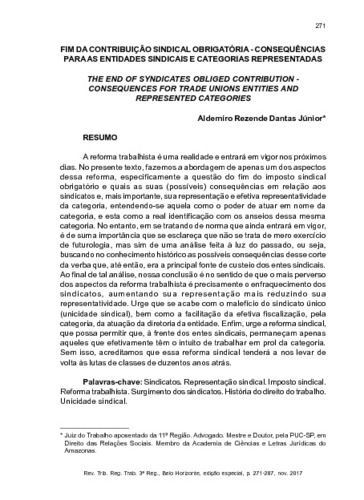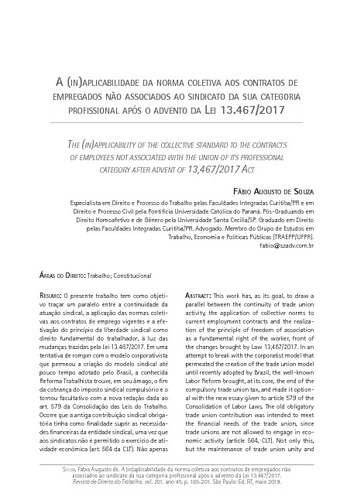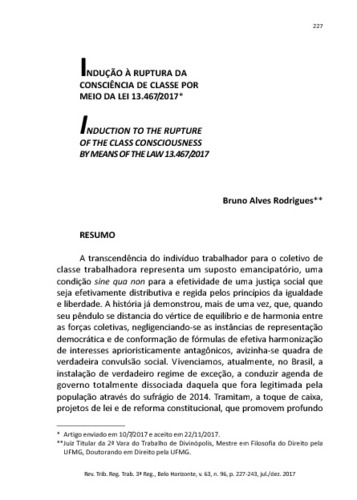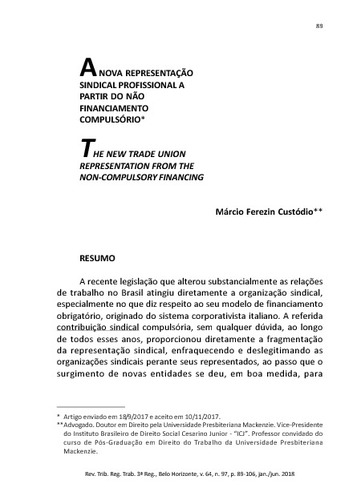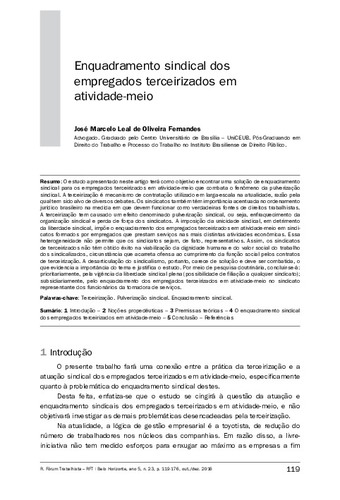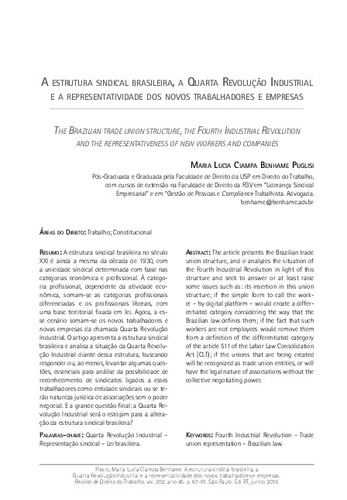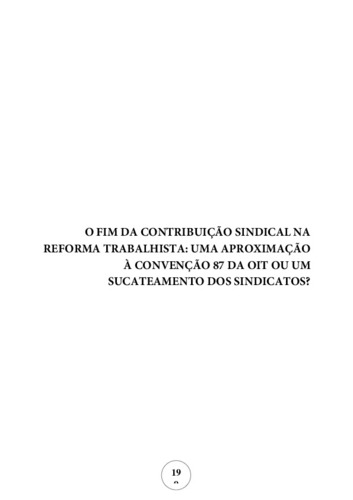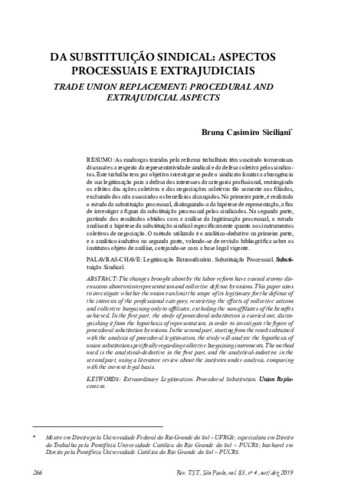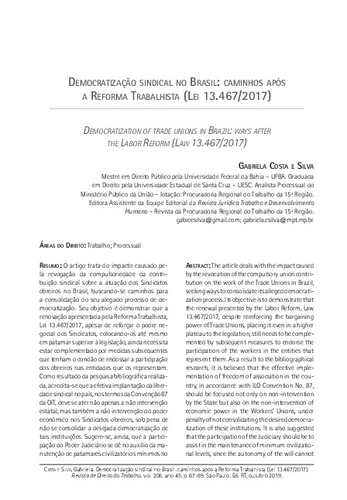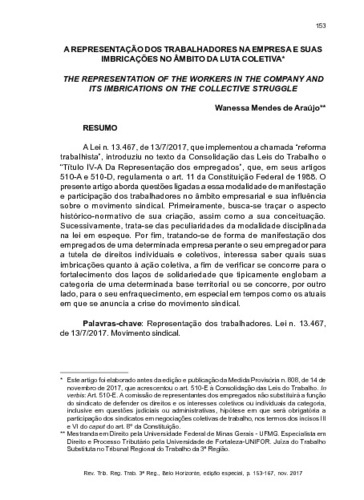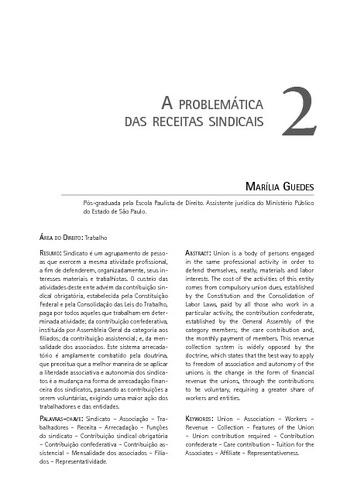Artigo de periódico
Fim da contribuição sindical obrigatória: consequências para as entidades sindicais e categorias representadas
| dc.contributor.author | Dantas Júnior, Aldemiro Rezende | |
| dc.date.accessioned | 2018-03-15T17:50:54Z | |
| dc.date.available | 2018-03-15T17:50:54Z | |
| dc.date.issued | 2017-11 | |
| dc.identifier.citation | DANTAS JÚNIOR, Aldemiro Rezende. Fim da contribuição sindical obrigatória: consequências para as entidades sindicais e categorias representadas = The end of syndicates obliged contribution: consequences for trade unions entities and represented categories. Revista do Tribunal Regional do Trabalho da 3ª Região, Belo Horizonte, n. especial, p. 271-287, nov. 2017. | pt_BR |
| dc.identifier.uri | https://hdl.handle.net/20.500.12178/127095 | |
| dc.description.abstract | [por] A reforma trabalhista é uma realidade e entrará em vigor nos próximos dias. Fazemos a abordagem de apenas um dos aspectos dessa reforma, especificamente a questão do fim do imposto sindical obrigatório e quais as suas (possíveis) consequências em relação aos sindicatos e, mais importante, sua representação e efetiva representatividade da categoria, entendendo-se aquela como o poder de atuar em nome da categoria, e esta como a real identificação com os anseios dessa mesma categoria. No entanto, em se tratando de norma que ainda entrará em vigor, é de suma importância que se esclareça que não se trata de mero exercício de futurologia, mas sim de uma análise feita à luz do passado, ou seja, buscando no conhecimento histórico as possíveis consequências desse corte da verba que, até então, era a principal fonte de custeio dos entes sindicais. Ao final de tal análise, nossa conclusão é no sentido de que o mais perverso dos aspectos da reforma trabalhista é precisamente o enfraquecimento dos sindicatos, aumentando sua representação mais reduzindo sua representatividade. Urge que se acabe com o malefício do sindicato único (unicidade sindical), bem como a facilitação da efetiva fiscalização, pela categoria, da atuação da diretoria da entidade. Enfim, urge a reforma sindical, que possa permitir que, à frente dos entes sindicais, permaneçam apenas aqueles que efetivamente têm o intuito de trabalhar em prol da categoria. Sem isso, acreditamos que essa reforma sindical tenderá a nos levar de volta às lutas de classes de duzentos anos atrás. | pt_BR |
| dc.description.abstract | [eng] Labor reform is a reality and it is vigoring on the next few days. In the present text we approach only one aspect of this reform, specifically the issue of labor unions obliged tax contributions and what are the - possible - consequences for the trade unions and, most importantly, it’s representation and effective representatives, understanding the former as having power to act on behalf of a particular trade union and the latter as the genuine identification with the aspirations of a particular trade union. Nevertheless, when regarding a regulation that has yet to become active, it is of great importance to shed some light that this is not a matter of clairvoyance, but an analysis through old lenses, that is, retrieving from historical facts the probable consequences of this fund cuts which, until now, was the main source of financing these syndicates entities. At the end of this analysis our conclusion is in the sense that the most perverse aspect of labor reform is precisely to frail the syndicates, rising up its representation but diminishing its representativeness. It urges that a malefic sole syndicate (union unicity) comes to an end, as well as the facilitation of an effective supervision, by a particular union category, of the board directors activities of their entities. Ultimately, an union reform urges, one that allows that those in charge of an union are those who effectively have the intention of working in favor for that category. Without these we believe that this labor reform tends to lead us back to two centuries ago class struggles. | pt_BR |
| dc.description.tableofcontents | Surgimento histórico e evolução do direito do trabalho -- O enfraquecimento dos sindicatos: mais representação e menos representatividade | pt_BR |
| dc.language.iso | pt_BR | pt_BR |
| dc.relation | Brasil. Lei n. 13.467, de 13 de julho de 2017 | pt_BR |
| dc.relation.ispartof | Revista do Tribunal Regional do Trabalho da 3ª Região: (nov. 2017). Edição especial | pt_BR |
| dc.relation.uri | https://www.lexml.gov.br/urn/urn:lex:br:federal:lei:2017-07-13;13467 | pt_BR |
| dc.subject | Sindicato, direitos e deveres, alteração, Brasil | pt_BR |
| dc.subject | Contribuição sindical, alteração, Brasil | pt_BR |
| dc.subject | Reforma trabalhista, Brasil | pt_BR |
| dc.subject | Legislação trabalhista, alteração, Brasil | pt_BR |
| dc.title | Fim da contribuição sindical obrigatória: consequências para as entidades sindicais e categorias representadas | pt_BR |
| dc.title.alternative | The end of syndicates obliged contribution: consequences for trade unions entities and represented categories | pt_BR |
| dc.relation.references | Brasil. Consolidação das leis do trabalho (CLT) (1943), art. 578; art. 579 | pt_BR |
| dc.type.genre | Artigo de periódico | pt_BR |
| dc.identifier.rvbisys | 001117921 | |
| dc.relation.ispartoflink | https://hdl.handle.net/20.500.12178/126611 | pt_BR |
| dc.relation.referenceslink | https://www.lexml.gov.br/urn/urn:lex:br:federal:decreto.lei:1943-05-01;5452 | pt_BR |
Coleção
-
Artigos9527


